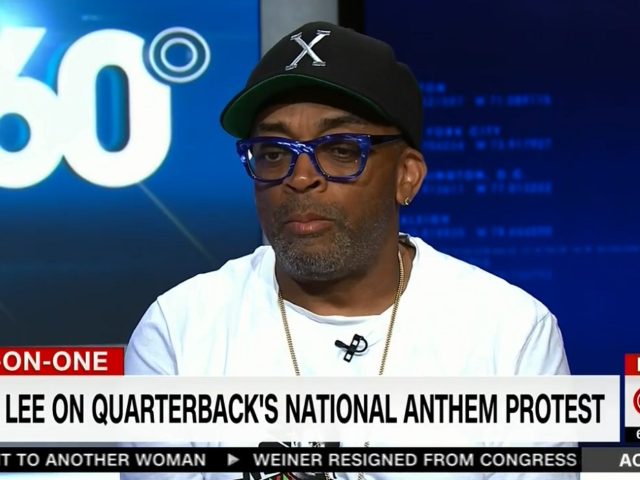Monday on CNN’s “Anderson Cooper 360,” filmmaker Spike Lee weighed in on the controversy involving San Francisco 49ers quarterback Colin Kaepernick’s decision not to stand for the national anthem at an exhibition NFL game over the weekend.
Lee told host Anderson Cooper that Kaepernick’s stand was in the tradition of unpopular stands Muhammad Ali and Jackie Robinson had taken in their careers to make a political statement.
Transcript as follow:
COOPER: So what do you make of Colin Kaepernick not standing up?
LEE: I support him. I find it so interesting how people want to pick and choose what rights people have. Now, any time you talk about antigun violence, people run around screaming about they don’t want their Second Amendment rights to be infringed upon — the same way John Carlos and tommy smith raised their black glove fists at the ’68 Olympics in Mexico, the same way Muhammad Ali refused to fight for a war that was just as crazy.
COOPER: Refused to fight the Vietnam War.
LEE: Yes. The Vietnam War. These are rights Americans have.
COOPER: You see what he is doing, what Colin Kaepernick is doing as in that tradition?
LEE: Yes, it’s in that tradition of black athletes standing up, saying I’m not using their platform saying I’m not happy with the way black people, people of color are being treated.
COOPER: It’s so interesting because often at the time when an athlete does it, they are vilified.
LEE: The biggest revision story ever – Muhammad Ali at one time was the most hated person, people need to Google, do research. Muhammad Ali was the most hated person in America.
COOPER: He couldn’t box in America.
LEE: Muhammad Ali, people loved him lighting up the torch, where his arm was shaking in the Olympics in Atlanta. But not the defiant. He said no Viet Cong ever called and I’m not going to say — the “n” word.
COOPER: The New York Times wouldn’t call him his name. They called him Cassius Clay.
LEE: Not even call the guy his name, so I think it’s in the same tradition. I find it very interesting that three members of big blue, the New York football Giants, on presently playing and two retired are the ones that criticized him. Three — that’s my team. Three of those brothers, they should understand what tradition, the history of why Colin did this. Now, I bet you went to all three of them, they would say they loved Muhammad Ali. How could you love Muhammad Ali and not love him for the stance he took not to be inducted into the Vietnam War. If you say yeah, yeah, yeah, it’s the same thing.
COOPER: Muhammad Ali said if I kept my mouth shut just because i can make millions, then this ain’t doing nothing so I just love the freedom and the flesh and blood of my people more so than i do the money. And Jackie Robinson said i cannot stand and sing the anthem, I cannot salute the flag, i know that I’m a black man in a white world. That was Jackie Robinson in 1972 in his autobiography.
LEE: This is the tradition. What Colin is doing now is not popping out of nowhere. There’s tradition, tradition of African-American athletes standing up and using their platform to say something is wrong.
COOPER: Do you think he’s going to pay a price for it?
LEE: They all do. Muhammad Ali, three years of his prime. John Carlos, Tommy Smith, of course. But these brothers do this knowing that there will be ramifications and they don’t care because this is their belief.
Another thing I have to say. They always bring up oh, “You’re making a lot of money,” so the reason, because you make money, that means that you can’t have a moral foundation and speak — like here’s the thing. Black athletes, we pay you money, play ball, shut up, don’t say nothing, we’re giving you money, million dollars, just to go out there, run up and down the gridiron, run up and down the court and just be quiet and play.
COOPER: There have been a lot of athletes who don’t want to risk their endorsement deals, things like that.
LEE: Look, I understand that. It’s all individual choice. But when someone has the courage to step out knowing they could lose all that, why you going to jump on the brother?
COOPER: Do you stand up during the national anthem?
LEE: Yes. But it’s a personal choice. That is not — me standing up for the national anthem does not affect me doing “Malcolm X” or “Do the Right Thing.” all the other documentaries. That has nothing to do with it for me. I stand up. But I’m not going to –
COOPER: You also stand up for his right not to?
LEE: Yes.
COOPER: Spike Lee, thank you.
Follow Jeff Poor on Twitter @jeff_poor

COMMENTS
Please let us know if you're having issues with commenting.